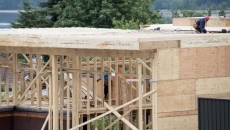The British Columbia government tabled legislation Thursday that's designed to hold public bodies accountable for addressing systemic racism in policy and programs, the province's attorney general said.
Niki Sharma said the proposed law would cover provincial ministries, agencies, health-care and social service providers, and require the development of a public action plan using data the government has collected on systemic racism.
She said it would give her ministry the power to issue compliance orders if it finds a lack of response to the action items in the plan.
Before tabling the bill, Sharma said she sometimes thinks of the politicians who have come before her in the legislature, who passed laws designed to hurt people based on the colour of their skin.
"The power that was wielded in that place, that was directed toward racialized people in this province, you just can't even imagine the generations of pain and trauma and impact that that's had," she said.
"The government can change that."
Sharma said the province will establish an anti-racism committee to help guide the development of the action plan by June 1, 2026, and develop standards and targets.
(1/2) Today I proudly introduced the Anti-Racism Act, built through one of the largest consultations with indigenous partners and racialized people in BC. https://t.co/kRmbWcXOm0 pic.twitter.com/q3yOeGA0Rf
— Niki Sharma (she/her) (@NikiSharma2) April 11, 2024
The legislation also requires public bodies to develop and implement a training curriculum on Indigenous history, set targets for the recruitment and retention of Indigenous and racialized people, and regularly assess their policies and programs.
Years of breaking people's trust can make them afraid to engage with the government because of the colour of their skin, Sharma said.
That could mean fear of reporting a crime to the police, going to an emergency room, or speaking up in a classroom.
"Government is here to represent the people of this province and it's our job to ensure that everybody in British Columbia has the support that they need, not just to live, but to thrive," she said.
B.C.'s Anti Racism Data Act came into effect in 2022, allowing for the collection and use of personal information for the purposes of identifying and eliminating systemic racism. It requires the province to release statistics annually.
Sharma said the first data would be released soon, giving the ministries and other provincial agencies a baseline to start from.
"What this act requires is government to take action on that (data)," she said.
"So, to receive the data, come up with clear action plans that are public for how they're going to address what they're seeing in the data, and then we have external structures to keep government to account moving forward."
B.C.'s Human Rights Commissioner, Kasari Govender, said she welcomes the new legislation and sees it as a significant stride toward addressing systemic racism.
However, she said "much remains to be seen" about how it will be implemented and whether it will be effective in addressing significant racial inequalities and discrimination in the province.
"I will be watching closely to ensure systemic racism is properly identified and that the public bodies responsible are tasked with taking meaningful action," Govender said in a statement.
"I also look forward to when municipal police forces, school boards, health authorities and other public bodies are brought within the purview of the act."






